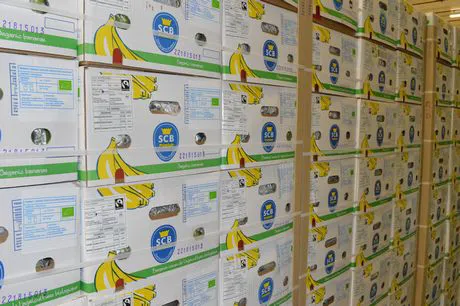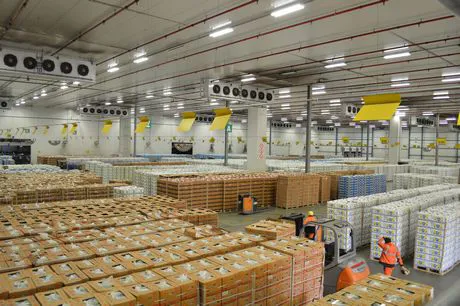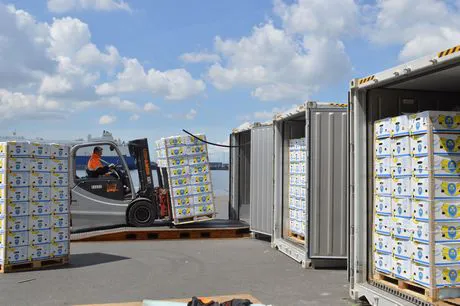For many products, Latin America is the market leader in production. These countries are lord and master on the market, especially for bananas. Only a small number of companies specialise in the import from Africa. Every week, a ship with bananas from Africa docks at the Vrasenedok in Antwerp. The French import giant Compagnie Fruitière started a joint venture with Euroports in 2013: EuroFruitPorts. Peter Tops and Jan Simons saw the company develop in recent years.
“We mostly handle bananas,” says Jan, Operations Supervisor. “Besides, we do some other seasonal products. For example, we now have potatoes from Israel, but we also do mangoes and cherry tomatoes during the season.” By far the largest part, 90 per cent, of the products unloaded at EuroFruitPorts are meant for Compagnie Fruitière.
Bay of Biscay
Four boats travel between West Africa and Antwerp via Portsmouth in a four-weekly flow, to ship the fruit and vegetables from Compagnie Fruitière to Europe. “We have to stick to this schedule, because we also have contracts with the ripening plants,” Jan continues. That means the boat has to have arrived on Sunday evening or Monday morning. During the winter months, it can be quite stormy in the infamous Bay of Biscay. That’s why an additional boat is used between week 40 and week 15, to avoid delays.
“This year, we used a full container vessel for the first time,” Peter says. He therefore also expects Compagnie Fruitière to look at a future with full container vessels. That rise of reefer containers is quite visible for major banana brands. Jan sums up several major brands that use a lot of reefers: “Del Monte, Fyffes, Chiquita and Bonita.” In coming years, reefer containers will gain a larger market share. Conventional reefer containers aren’t built anymore, trade routes from South Africa, Israel, New Zealand and Latin America only use reefer containers, and large container shipping companies such as Maersk and MSC have started noticing, among other things, the banana sector. “Maersk and MSC have boats with more than 500 plugs for reefers,” Jan knows. “That means they can transport 10,000 pallets of fruit and/or vegetables every time.”
Reefer containers in Africa
The developments on the market are slower in affecting the African routes. “We have noticed Africa is slower to evolve regarding innovations, but that is logical. Labour costs are much cheaper there, and prices more attractive,” Peter explains. That can also be seen at other levels. European ports are equipped to unload boats using cranes, but the ship’s cranes are needed to move the shipment to the quay in African ports. Two years ago, an investment was therefore made in a boat with a lifting system to unload the banana boxes. “In the four African ports, of a total of six ports of call, that is quite an advantage,” Peter adds.
The reefer container has another advantage in Africa. Many packing stations at banana plantations in Cameroon have limited storage. In practice, a lorry visits various packing stations to fill a container before it’s loaded in the port. That means the containers have to be unpacked and sorted in Europe. The largest share of bananas marketed by Compagnie Fruitière is sold under their own labels. For German retail, the company also works with specific brands. For now, Germany is a small market for the company. These products are packed in different labels from retailers, so that a fixed share is currently brought on the German market.
Growing assortment
“In recent years, we have seen the quality of the products arriving here improving,” Jan continues. That is the result of, among other things, better monitoring in production countries and better packaging. “In the past, we sometimes received parties that had already started ripening, but I haven’t seen that in a few months,” Peter explains. “They’re continuously working on improvements.” Besides these investments, Compagnie Fruitière is growing, and the assortment is becoming broader. Additionally, they now also import from Ecuador. “We see many mangoes, pineapples, and occasionally avocado and grapefruit,” Jan says. The cold store of EuroFruitPorts are therefore filled to capacity.
The empty boats are loaded with products for the plantations in Africa. Generators, fertiliser, packaging, but also secondhand cars are brought to Ivory Coast, Cameroon, Senegal or Ghana on the way back. Besides, the holds are also filled with potatoes and onions.
Traffic congestion in Antwerp requires flexibility
In recent months, there were quite a few reports on the traffic congestion on the ring road of Antwerp. This problem will not be solved in the coming years, because of announced roadworks. Peter expects it will only become worse. That requires adjustments. Jan explains measures have already been taken, some large port companies started a 24-7 service. “Promoting nights to unload containers at the large container terminals could make a significant difference,” he says. For smaller port companies, it requires more flexibility. “You could say you have to report before four o’clock in the afternoon, or you have to be more flexible and have some understanding for the transporters.” For the future, inland shipping may bring some relief. For other products, inland navigation is already an important means of transport, but as yet there are very few inland vessels that have reefer plugs. “Cold stores could then also be located further inland. That could help solve the mobility problems,” Peter concludes.
More information:
Euro Fruit Ports
Peter Tops
Jan Simons






